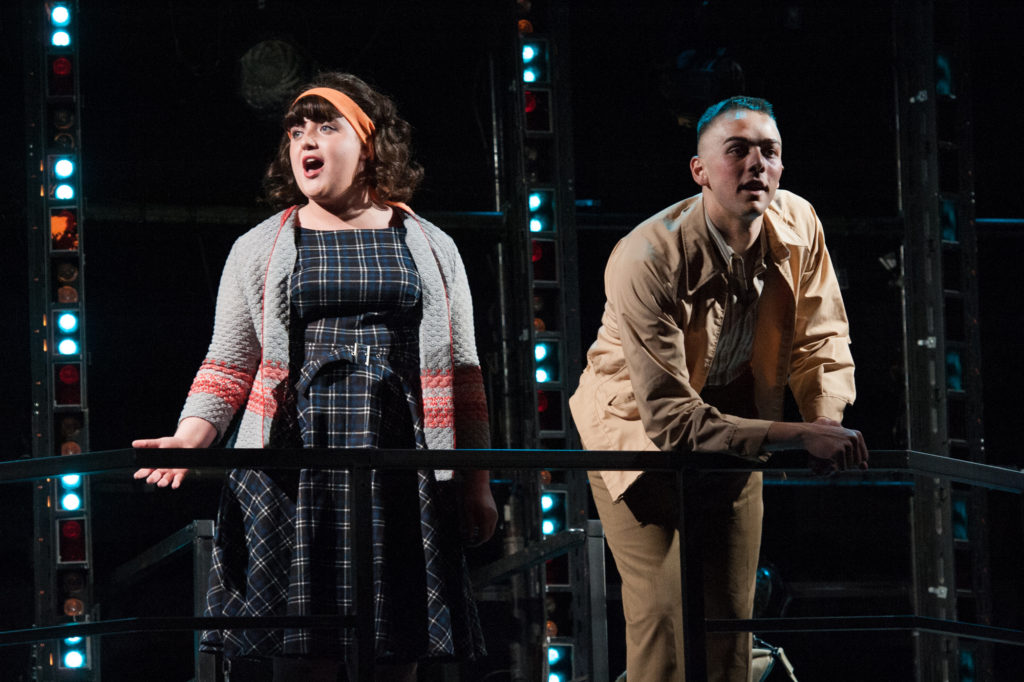
Eddie & Rose Take In the View; Photo by Glenn Perry.
Presented by SpeakEasy Stage Co.
Music and lyrics by Benj Pasek & Justin Paul
Book by Peter Duchan
Based on the Warner Bros. film and screenplay by Bob Comfort
Directed by Paige Daigneault
Music direction by Jose Delgado
Choreography by Larry Sousa
May 7 – June 4, 2016
Stanford Calderwood Pavilion
Boston Center for the Arts
Boston, MA
Speakeasy on Facebook
Review by Kitty Drexel
(Boston, MA) Dogfight is yet another musical with serious complications that SpeakEasy maneuvers with poise and dignity. It’s like Disney’s Newsies if the newsboys are replaced with marines and their fight for entrepreneurial justice is replaced with explicitly misogynistic displays of dudebro cruelty. Well, the music sounds a little like Newsies anyway.
This musical is about an ignorant jarhead who discovers that even fat women are people. Eddie Birdlace (Jordan J. Ford) and his buddies Boland (Jared Troilo) and Bernstein, the one minute wonder (Drew Arisco), are compete in a “dogfight,” a competition in which the marine with the ugliest date (ladies only) wins a cash prize. To sum up, Birdlace meets waitress Rose Fenny (Alejandra M. Parrilla) at her mom’s dinner. Thinking she’s a contender, he asks her out. She accepts and is wonderful despite his dickishness. He magically grows a conscience just in time to get shipped off to Vietnam.
Dogfight discusses some old fashioned homophobic, transphobic, and sexist issues. Less obvious is the onus that the musical places upon the audience to take responsibility for these still current issues. In what can only be described as genius levels of Brechtian manipulation, we are invited to laugh at the disgusting jokes as casual bystanders to bigotry. We’re caught in a catch-22: it’s a musical; we’re supposed to laugh, aren’t we? The jumpy music and the carefree attitude of the men entice us into forgetting that we are laughing at the abuse of the women. Responding with laughter means that we’ve unintentionally encouraged the actors in their “boys will be boys so let’s not correct them and instead put the blame on the victim’s” behavior.
The writers are sending the message that victims are not responsible for the behavior of their abusers. The writers’ work does not excuse our reactions to the work. We’re still responsible for monitoring our own behavior. Personally, I laughed a lot but I eventually, like most of the audience, I had a moment of realization and stopped laughing. Whether these Brechtian alienation tactics were intended or not, it wasn’t easy to shake off my shame. Laughing at cruelty is just as bad as engaging in it. We’re taught that in kindergarten. If only it were easy to remember in the moment.
The book by Duchan is good but the music and lyrics by Pasek and Paul vacillates between brilliance and profound laziness. Numbers such as the title song “Dogfight” have clever, chewy verses. For interested actors, this particular song could be great for auditions. “First Date/Last Night” is terrifically sweet. It’s a cute duet with fun harmonies. Any of Rose’s solos are standalone pieces great for auditions or recitals.
Parrilla is stellar as Rose. She sounds like folk goddess Mama Cass Elliot. She takes brave risks as a vocalist and acts with great sincerity. Rose is an admirable woman with a great arc that overwhelms the other characters onstage. She’s sweet and kind. Birdlace doesn’t deserve her.
Meanwhile, songs like “Come Back” and the Finale “Take Me Back” use repetition of their song titles in cheap efforts to be deep. Such repetition in any song makes an actor’s job more difficult than it already is: it’s basic theatre training that a word repeated must have a different intention with each repeat. Birdlace is having a rough time returning home. We get it. The audience understood the message the first 10 ten times we heard it.
To his credit, Ford does an excellent job with the little he’s given: Eddie Birdlace is an asshole. He thinks he can do anything and suffer no consequences. He’s emotionally dead. These flaws aren’t simply a matter of ignorance; Birdlace is cruel on purpose. Birdlace knows that dogfights are wrong; he participates anyway. Yet, Ford makes Birdlace just a little bit redeemable. Not very redeemable but a little. He’s just redeemable enough that it’s sorta conceivable that Rose can’t help but take another chance on him.
His friends, on the other hand, aren’t redeemable at all. Troilo (with his fluctuating southern accent) & Arisco do a great job of being smarmy dicks. Congrats!
The men’s ensemble needs to work on their musical cutoffs. They were almost never together.
Patrick Varner and McCaela Donovan, as their many characters, are fantastic in this show. They are working the stage like they own it.
Lastly, this musical could address size acceptance but doesn’t. There are many ways to be and feel beautiful. Dogfight sends the message that a conventionally attractive person might one day love a conventionally unattractive person despite their flaws. Dogfight neglects the simple truth that it is possible to be fat, and be loved. To be loved not because one is fat, or even despite it, but because size isn’t a universally quantifying property in romantic attraction. Rose is beautiful. This is true regardless of her appearance. With their lonely songs about inner beauty and manic pixie dreamgirl adventurous whimsey, it isn’t clear if the writers fully comprehend this.
Trigger warning: there are allusions to sexual acts in this show. It’s important to note that the actors keep their socks on. If you find this as offensive as I do, please avert your eyes and pretend that they take them off. There’s a special place in Limbo for people who keep their socks on during sexy times.
